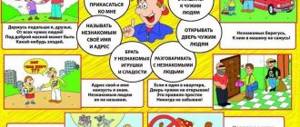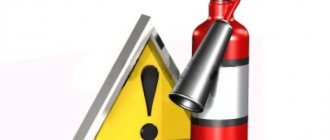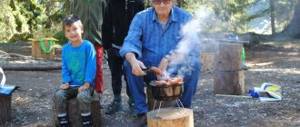Handling sharp objects
Every home has a lot of piercing, cutting, sharp products. These are knives, forks, pins, needles. If they are used as intended, they are absolutely safe.
When sharp objects are not in the right place, they can cause a lot of trouble. For example, needles cause pain, and if you handle a knife carelessly, you can cut yourself. Therefore, it is important to follow the safety rules at home, that is, put all items in their place. It is also important to use them as intended.
Electricity
Fire safety rules at home require careful handling of electrical appliances - a kettle, TV, iron, lamp and other items. If the equipment is broken, then it is considered dangerous. Failure of devices can cause fire, smoke, or electric shock. To prevent this, you must follow the following rules:
- When leaving home, you must turn off electrical appliances. Only the refrigerator can work. If you plan to leave the house for some time, then it is advisable to turn it off and defrost it in advance.
- The cord must be pulled out only by the plug. Do not pull the wire.
- Avoid using sockets that fall out of the wall.
- Exposed wires should not be touched with your hands.
- If the outlet catches fire, it is necessary to turn off the power to the home. If this is an apartment, then you need to go out to the staircase where the electrical panel is located. Apartment numbers are written next to the meter. There is a switch or button that turns off the power. Then you should return to the apartment, turn off the outlet, covering it with thick material.
Equipment must be repaired in a timely manner. If you have problems with sockets and wiring, you should call an electrician. Carrying out repairs yourself is dangerous.
Household chemicals and medicines
Personal safety rules at home include proper handling of household chemicals and medications. You need to remember that:
- It is prohibited to use medications whose names are unknown (drugs without packaging or in bottles with erased labels).
- Medicines that have expired should be thrown away.
- Cleaners and detergents often cause allergies, so they should be used based on the instructions. If the condition of the room worsens during treatment, you need to finish the work and ventilate the room. If you have facial swelling or other signs, you should consult a doctor.
- Cleaning should be done with rubber gloves.
Presentation “Rules of safe behavior in life and everyday life” presentation for the lesson
Slide 1
Rules for safe behavior in life and everyday life. Every person should know and follow the general rules in everyday life so that emergency situations are not taken by surprise. Each dangerous and emergency situation has its own specifics and requires specific human actions, taking into account the current situation. Prepared by teacher Sergeeva L.S.
Slide 2
• When electric current passes through the human body, it heats up and can cause burns. Electrical burns can cause serious damage to the internal tissues of the human body. • In addition, electrical shock may cause cardiac arrest or respiratory failure.
Slide 3
General rules for safe handling of electricity. do not use faulty electrical appliances, never leave a switched-on electrical appliance unattended; do not plug several electrical appliances into one outlet; follow the order of connecting an electrical appliance to the network: first, connect the cord to the device, and then the cord to the network;
Slide 4
handling electricity. switching off the device is done in the reverse order; do not touch the switched on electrical appliance with wet hands; remember: you cannot use electrical devices while in water; Immediately inform your parents or elders about detected malfunctions in electrical appliances, exposed or poorly insulated wires.
Slide 5
Rules for using the water supply system. Do not throw foreign objects into the drain. Avoid clogging the sink with food waste. When leaving home, check that all taps are closed. Monitor the condition of the pipes to promptly eliminate leaks in them.
Slide 6
If you find a leak: Tell an adult immediately. Call the control room, tell them what happened, and ask them to send a specialist plumber. Turn off the electricity and turn off the water. Place basins, buckets, pots or other containers in areas of leaks; promptly remove any water that has accumulated on the floor.
Slide 7
Rules for working with a computer: position yourself at the computer so that the distance to the display is at least 50 cm; watch your posture: do not slouch or lean too much towards the screen or keyboard; the duration of a student’s work at the computer should not exceed 25 minutes;
Slide 8
Internet safety rules: when you register on websites, try not to indicate personal information (mobile phone number, email address, your photo); unwanted letters from strangers are called “Spam”, if you receive such a letter, do not respond to it;
Slide 9
if you receive a message from an unfamiliar address, it is better not to open it, such letters may contain viruses; if there are no adults around you, do not meet in real life with people you met on the Internet.
Slide 10
Thank you for your attention
Gas use
Household gas is characterized by good flammability. With a leak comes the risk of fire or explosion. When it enters the human body, it causes suffocation and death. Therefore, it is important to follow safety rules at home.
If you smell gas, you should:
- Ventilate the room.
- Make sure the gas stove taps are closed.
- Call emergency services.
- Avoid the possibility of fire - do not turn on the lights or light matches.
To avoid the unpleasant consequences of a gas leak, it is advisable to prevent it. To do this you need:
- Monitor the operation of the burner, do not leave the kitchen or apartment when preparing food.
- Use the gas stove for its intended purpose. It is forbidden to turn it on to heat the air in the room and dry clothes.
- Water from the dishes should not flood the gas.
Children should be taught not to play with matches and lighters, as this often causes fire. A child should not light fireworks or sparklers if he or she is home alone. Some private houses have a stove. Children should not open the oven door.
Actions in case of emergency
But no matter how hard we try to protect ourselves from everything, an accident can happen at any moment. And everyone needs to know how to act.
Actions in case of fire. If there is a fire, first try to put it out yourself. An adult can most often put out a curtain fire himself. If everything is serious, then take your money, documents, warm clothes and leave the house, calling the fire department. Often, falling into a panic, people take flowers, dishes and other things unnecessary in this situation. Therefore, it is important to remain calm.
Flooding of an apartment: what to do. If there is a flood and water is gushing out of the pipe, then first of all turn off the water in the apartment, then rewind the gap with a rag or towel, substitute a basin or bucket. And immediately call the emergency service, because only they will be able to completely shut off the water in the riser and fix the leak.
Actions to take if you smell gas. If you smell gas, immediately call emergency services, open the windows and wait for specialists. Never turn on anything electrical - lights, household appliances. This could create a spark that could lead to an explosion.
What to do if you get stuck in an elevator? If you get stuck in an elevator, don't panic, it happens to many people. You need to contact the dispatcher, outline the situation and wait for specialists. No need to rock the elevator and jump in it.
If you have been robbed, then in this case you need to call the police, do not touch anything in the house and try to make a list of what was stolen.
What to do in case of fire?
Rules for personal safety at home in case of fire will help you act wisely:
- A small fire should be extinguished with thick material or a blanket, pouring water on the fire.
- If the flame does not go out, you need to run away from it to a safe distance. Then you need to call the fire department or ask your neighbors to do it.
- If you cannot get out of a burning home, then you must immediately call the fire department and provide the address.
- Smoke is considered more dangerous than fire. Many people die precisely because of him. If there is not enough clean air, then you need to squat down and crawl towards the exit. It is believed that there is less smoke below.
- In case of fire, it is prohibited to ride the elevator. Usually it turns off in such cases.
- When waiting for firefighters, you must remain calm and do not jump out of the window.
- You need to listen and follow the instructions of firefighters.
Rules for safe behavior at home
Home safety.
If at the entrance - why?
Why? - Strangers are standing there, It’s better for you not to go in alone: Maybe they want to offend? You ask your friends to quickly escort you home, and once you are in your apartment, close the doors tightly!
If your apartment is high up
and it’s not easy to get there, use the elevator, but just remember: Don’t get into the elevator with strangers! They can offend you, scare you, and take away your valuables. Be careful, my friend, be careful And don’t get in the elevator with strangers!
Don't forget your keys outside the door
You are already quite big
and you are going home alone. Open the door with the keys, but don’t leave it in the lock! After all, if you forget to put them away, a stranger might take them and enter your apartment... Be careful, keep in mind!
1. Only someone you know well can open the door. 2. Don’t leave the apartment key in a “safe place” 3. Don’t hang the key on a cord around your neck. 4. If you have lost your key, inform your parents immediately.
When the doorbell rings,
look through the peephole first, Find out who came to you, But don’t open it to strangers! If there is no peephole, then "Who's there?" always ask, And they won’t answer - Don’t even try to open the door! If they start banging on the door, call the police quickly!
There are a lot of bottles,
different tubes and jars in the apartment. They store various means, even sometimes dangerous ones. There is no need to put creams, pastes and tablets poisoning is guaranteed and your health is damaged!
Not only fire, but also steam burns
when it is released from the pan. So be careful with boiling water. And firmly grasp these rules: Don’t jerk the lid off the pan, but gently lift it from the edge . Not where you are standing, on the other hand, After all, your hands shouldn’t get hurt! Let off the steam to the side - and then the water in the pan will not be dangerous.
If you go out onto the balcony, just know this:
Don’t stand on the chairs there! It can be dangerous - scary to fly from a height. Don't climb on the railing, don't lean too low - it will be difficult to hold on... You don't want to fall down, do you?
If you want to open the window,
try to be careful: Don’t stand on the windowsill and don’t press on the glass. If you can’t get something, it’s safer to call adults and ask them about it... It’s better not to joke with dangerous people!
If the phone rings,
Someone says into the receiver: “What’s your name, baby?” Who are you sitting at home with now? And where did I end up? What number did I dial? - Don’t answer anything, call your mom urgently! If there are no adults at home, do not have conversations with anyone, - Goodbye! - say, hang up quickly!
Don't throw sharp objects around
If the buttons from the box
scattered - collect them, If you saw nails on the road - pick them up! These sharp objects should not be on the floor. You yourself will step unnoticed , or on a nail, or on a needle.
Don't eat dirty fruits and vegetables
Friends, you need to take care of your health.
And therefore it is necessary to wash Fruits and vegetables before eating Cleanly and thoroughly with warm water. So as not to disturb the doctors, wash away the germs and you will be healthy! A washed apple shines brighter, and it doesn’t hurt your stomach.
If trouble happens to someone, provide all possible help
Has something happened to your friend?
Don’t ever leave him, but cheer him up, “everything’s okay!” - say, provide all possible help yourself. If you can’t help him, don’t run away in fear, call adults for help as soon as possible! Don’t waste your time and energy! Remember: in the forest, on land, on water, People do not abandon people in trouble!
What to do when visiting a stranger?
Personal safety rules include standards of conduct when strangers arrive:
- You need to look through the peephole and also ask who came and why.
- You should not open the door right away. It only needs to be opened slightly without removing the chain.
- If a person introduces himself as an employee, for example a police officer, then you need to ask him for documents.
- When asking for help, it is advisable to offer to call the police, firefighters or gas service workers. In this case, it is better not to open the door.
- There is no need to talk to a person through the door for a long time if you decide not to open it.
- You shouldn't tell a stranger that no one is home. It is advisable to tell him that there is someone in the room, but he is busy or resting.
Other safety rules
Other home safety rules must be followed. The world around us is dangerous even at home, so it is important to adhere to the following requirements:
- You should always close the door to your apartment, even if you plan to go out for a short time.
- Don't forget to turn off the water taps.
- All dangerous things must be kept out of the reach of children.
- You should not ride in an elevator with strangers.
- At home, you should write down emergency numbers and post them in a visible place.
There are home safety signs that you can make yourself. For example, they can be hung near the entrance. Every time you leave the house you need to pay attention to them. With their help, you can control the shutdown of appliances and the closing of windows. Then it will be easier to follow the safety rules at home. Conventional signs can be hung in special places. For example, near the iron you should place a picture and an inscription about the need to turn off the device after use.
Ensuring personal safety at home
SECURITY
PERSONAL SAFETY AT HOME
The safest place for a person is his home. However, under certain conditions it can become dangerous. To prevent this from happening, you need to know and follow the rules of safe behavior at home. Compliance with these rules will limit the criminal's options.
Of course, it is impossible to take into account all the dangerous situations that may arise at home, but for most of them there are standard recommendations:
∙ Never open the door without looking through the peephole and asking who came.
∙ If you are home alone, do not open the door to anyone, even if these people introduce themselves as utility workers, police or post office workers. Ask to come back later.
∙ If you are asked to bring something to drink or to make a call, explain how to get to the nearest store and pay phone.
∙ Do not talk about the daily routine of your family members.
∙ If you need to leave the apartment, before opening the door, look through the peephole to see if there are strangers behind the door.
∙ After opening the door and leaving the apartment, close the door behind you.
∙ Don’t look through the mail near the mailbox, go home and look there.
∙ If a stranger asks you to take the elevator, refuse.
∙ If a stranger tries to cover your mouth, try to bite his hand.
∙ If friends decide to come to you, it is better to meet them at the bus stop and then bring them home.
Remember also the rules of safe behavior when talking on the phone:
∙ Never tell anyone that you are home alone.
∙ When picking up the phone, do not say your name.
∙ If you are asked to give the address, do not give it, ask to call later, stating the time of arrival of the parents.
∙ Do not participate in surveys by telephone.
∙ If someone tries to engage you in inappropriate conversation, hang up and tell your parents.
Now let's look at the rules of behavior in the most common dangerous situations that can happen at home.
THIEVES IN THE APARTMENT
If you open the door and there are thieves in the apartment:
∙ Don’t get confused, try to quickly go out and slam the door, lock it with a key, and leave the key in the lock.
∙ Knock on your neighbors' doors and ask them to come to your aid.
∙ Ask neighbors to urgently call the police.
∙ If the intruders managed to open the door, immediately leave the landing and run down to the exit.
∙ With the help of your neighbors, call the police. Try, without putting your life in danger, to detain the intruders in the house until the police arrive.
ATTACK IN ELEVATOR
First of all, you should remember a few rules
to prevent an attack in an elevator:
✔ Enter the elevator only after making sure that there is no stranger on the platform who could follow you into the cabin.
✔ If there is already a stranger in the elevator you called, do not enter the cabin.
✔ If you enter an elevator with a stranger, do not stand in the elevator with your back to him, but watch his actions.
If an attack occurs:
✔ Shout, make noise, knock on the walls of the cabin. Protect yourself by any means necessary.
✔ Keep pressing the nearest floor button and call button.
✔ If the elevator doors open, try to jump out onto the landing, call the residents of the house for help and run out into the street.
✔ Once you are safe, immediately call the police on 02, tell them what happened to you, the exact address, tell the signs and direction of the attacker’s departure.
ATTACK IN THE ENTRANCE
If the house is equipped with an intercom, call your apartment before entering the entrance and ask your parents to meet you.
Don't go out on the stairs at late hours. It is better to take out the garbage in the morning.
If there is a threat of attack, make some noise, attract the attention of your neighbors, and try to jump out into the street.
In the event of a sudden attack, assess the situation and, if possible, defend yourself in any way. Try to buy time until some help arrives.
Once you are safe, immediately notify your parents and call the police.
Remember, a doorbell, a phone call, a meeting with a stranger at the entrance of a house, in an elevator, on a staircase can only come as a surprise to an unprepared person. For a person who knows the rules of personal safety, dangerous situations when meeting strangers are unlikely. When a person knows where he is in danger, how to avoid meeting it and how to behave in a dangerous situation, he is protected.
Child safety
Safety rules must be followed not only by adults, but also by children. Moreover, they need to be taught this from early childhood. Children are taught not to open the door to strangers, not to play with fire, and to act correctly in emergency situations.
Children need to know how to call emergency services, so the phone and important numbers should be visible in the home. They need to be taught how to behave properly around strangers. Although such rules are taught in kindergartens and schools, with the help of parents, the child will understand them better.
Children can be left at home alone only after they are ready to do so. Therefore, safety rules with them must be periodically checked and home exams arranged. Then parents will be much calmer if their child can behave appropriately in different situations.









